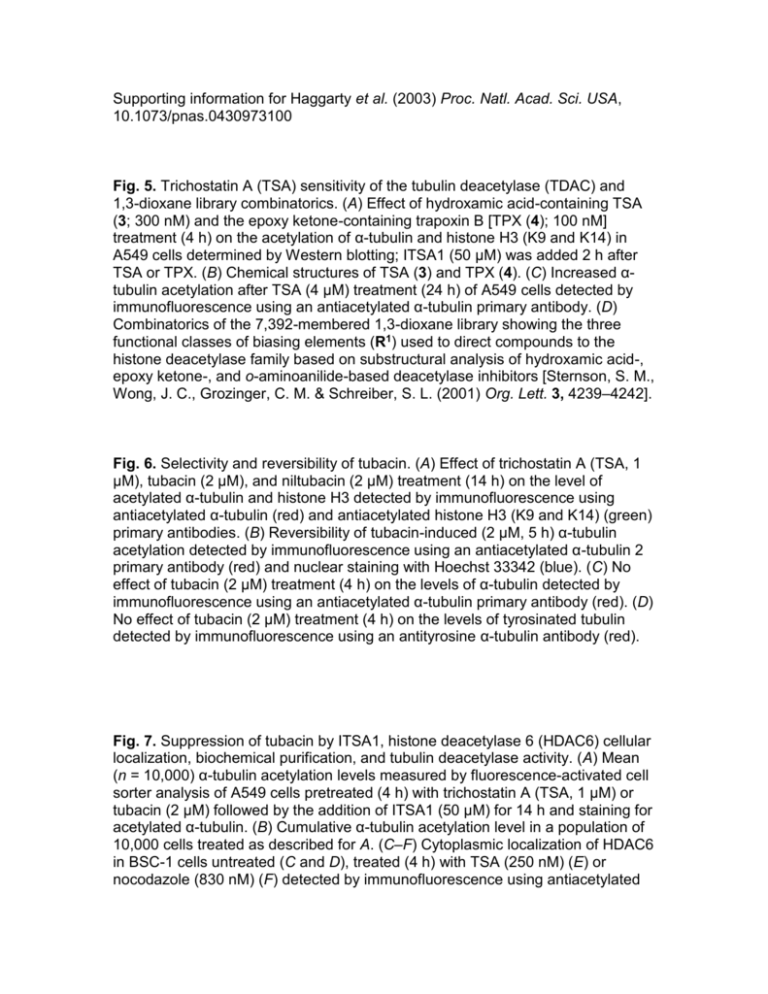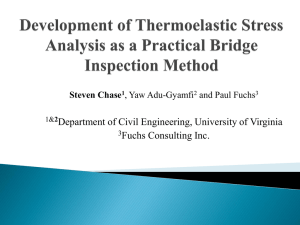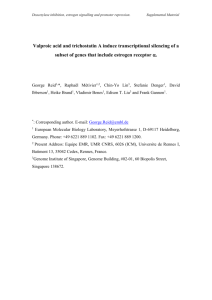Supporting information for Haggarty et al
advertisement

Supporting information for Haggarty et al. (2003) Proc. Natl. Acad. Sci. USA, 10.1073/pnas.0430973100 Fig. 5. Trichostatin A (TSA) sensitivity of the tubulin deacetylase (TDAC) and 1,3-dioxane library combinatorics. (A) Effect of hydroxamic acid-containing TSA (3; 300 nM) and the epoxy ketone-containing trapoxin B [TPX (4); 100 nM] treatment (4 h) on the acetylation of α-tubulin and histone H3 (K9 and K14) in A549 cells determined by Western blotting; ITSA1 (50 μM) was added 2 h after TSA or TPX. (B) Chemical structures of TSA (3) and TPX (4). (C) Increased αtubulin acetylation after TSA (4 μM) treatment (24 h) of A549 cells detected by immunofluorescence using an antiacetylated α-tubulin primary antibody. (D) Combinatorics of the 7,392-membered 1,3-dioxane library showing the three functional classes of biasing elements (R1) used to direct compounds to the histone deacetylase family based on substructural analysis of hydroxamic acid-, epoxy ketone-, and o-aminoanilide-based deacetylase inhibitors [Sternson, S. M., Wong, J. C., Grozinger, C. M. & Schreiber, S. L. (2001) Org. Lett. 3, 4239–4242]. Fig. 6. Selectivity and reversibility of tubacin. (A) Effect of trichostatin A (TSA, 1 μM), tubacin (2 μM), and niltubacin (2 μM) treatment (14 h) on the level of acetylated α-tubulin and histone H3 detected by immunofluorescence using antiacetylated α-tubulin (red) and antiacetylated histone H3 (K9 and K14) (green) primary antibodies. (B) Reversibility of tubacin-induced (2 μM, 5 h) α-tubulin acetylation detected by immunofluorescence using an antiacetylated α-tubulin 2 primary antibody (red) and nuclear staining with Hoechst 33342 (blue). (C) No effect of tubacin (2 μM) treatment (4 h) on the levels of α-tubulin detected by immunofluorescence using an antiacetylated α-tubulin primary antibody (red). (D) No effect of tubacin (2 μM) treatment (4 h) on the levels of tyrosinated tubulin detected by immunofluorescence using an antityrosine α-tubulin antibody (red). Fig. 7. Suppression of tubacin by ITSA1, histone deacetylase 6 (HDAC6) cellular localization, biochemical purification, and tubulin deacetylase activity. (A) Mean (n = 10,000) α-tubulin acetylation levels measured by fluorescence-activated cell sorter analysis of A549 cells pretreated (4 h) with trichostatin A (TSA, 1 μM) or tubacin (2 μM) followed by the addition of ITSA1 (50 μM) for 14 h and staining for acetylated α-tubulin. (B) Cumulative α-tubulin acetylation level in a population of 10,000 cells treated as described for A. (C–F) Cytoplasmic localization of HDAC6 in BSC-1 cells untreated (C and D), treated (4 h) with TSA (250 nM) (E) or nocodazole (830 nM) (F) detected by immunofluorescence using antiacetylated α-tubulin (red) and anti-HDAC6 (green) antibodies, and nuclear staining with Hoechst 33342 (blue). (G) Western blot analysis of HDAC6 purified from bovine brain after two rounds of polymerization–depolymerization of microtubules followed by elution of microtubule-associated proteins (MAPs) by phosphocellulose chromatography. HDAC6 is expressed abundantly in whole brain and eluted with MAP fractions. (H) Western blot showing the levels of acetylated α-tubulin and total α-tubulin after incubation of MAP-stabilized or pure tubulin with immunoprecipitants from transfected TAg Jurkat cells. Whereas TSA (1 μM) and tubacin (1 μM) inhibited α-tubulin deacetylation, niltubacin (1 μM) or trapoxin B (TPX, 1 μM) did not. In contrast to Hubbert et al. [Hubbert, C., Guardiola, A., Shao, R., Kawaguchi, Y., Ito, A., Nixon, A., Yoshida, M., Wang, X. F. & Yao, T. P. (2002) Nature 417, 455–458], HDAC6 showed partial α-tubulin deacetylase activity in the absence of MAPs or additional stabilizing factors. Fig. 8. Effect of tubacin on microtubule stability. (A) No effect of tubacin on the stability of microtubules to cold depolymerization (90 min, 4° C) (Left) or calcium depolymerization (2 mM CaCl2; 37°C)(Right) in A549 cells. (B) Microtubule depolymerization by nocodazole (332 nM, 5 h) is dominant to the effects of tubacin (2 μM) (S1–S4), and neither tubacin nor ITSA1 (50 μM, 30 min) prevents the repolymerization of microtubules after removal of nocodazole (S5–S8) determined by immunofluorescence 3 using antiacetylated α-tubulin (red) and nuclear staining with Hoechst 33342 (blue) in A549 cells. Fig. 9. Localization of histone deacetylase 6 (HDAC6) in mitotic cells. Colocalization of HDAC6 with acetylated α-tubulin in NIH 3T3 cells in interphase (A), prophase (B), metaphase (C), and telophase (D) detected by immunofluorescence using antiacetylated α-tubulin (red) and anti-HDAC6 (green) antibodies and nuclear staining with Hoechst 33342 (blue).








